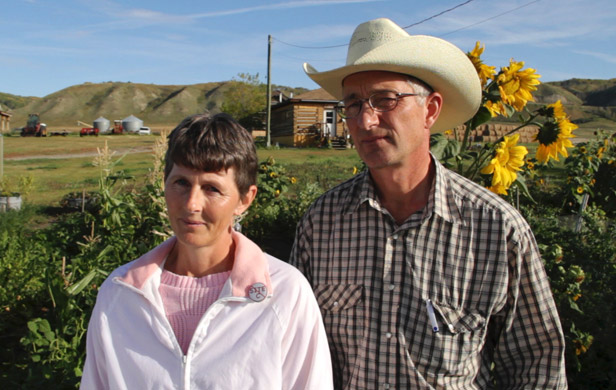
A federal court judge has denied BC Hydro’s motion to rush a legal challenge against the crown corporation’s planned Site C Dam project. Hydro sought to expedite the hearing in May in order to keep to its planned construction start this summer – after receiving its provincial and federal environmental certificates late in 2014 – but that’s now up in the air.
According to a media advisory from the plaintiff, the Peace Valley Landowners’ Association (PVLA), the hearing will likely be scheduled for sometime this summer, depending on the court’s availability. Hydro argued that such a delay would cost the utility money, but the judge gave more weight to the plaintiff’s need for time to prepare its case.
Need, financial case for Site C challenged
The case is being brought by lawyer and ex-TD Bank Comptroller Rob Botterell on behalf of many of the landowners in the Peace Valley whose farms would be flooded or disrupted by the dam. Their challenge is built partly on the fact that the Liberal Government excluded the public’s independent energy watchdog, the BC Utilities Commission, from reviewing the project. The regulator was built precisely for this purpose: to examine proposed energy projects and plans based on their need and value to taxpayers and ratepayers.
This step, along with the provincial government’s decision to ignore the strong misgivings of the Joint Review Panel surrounding the need and financial case for the project constitute excessive political interference in the plaintiff’s view. Noted Botterell in a media advisory on the eve of the project’s approval last year:
[quote]Public infrastructure decisions of the size and scope of Site C…require the most thorough public scrutiny. It is simply unacceptable to make such decisions behind closed doors, release limited explanatory information, and conduct public policy by news conference sound bite. For the largest public infrastructure decision in provincial history we deserve better: open, transparent, and unfettered review of Site C’s economics by the independent and expert BC Utilities Commission.[/quote]
Government ignored its own rules
The PVLA’s case is also anchored in the fact that the provincial government violated the very rules that it laid out in the terms of reference for the Site C review. According to the PVLA:
[quote]The Ministers relied upon a referral package from the Environmental Assessment Office that declared several key Panel recommendations to be beyond the scope of the Panel’s mandate. The PVLA Petition is based on a thorough review of the documents which set the scope of the Panel’s mandate, and which reveal that the Panel was not only permitted but was expressly required to assess the very economic impacts of the Project that were the subject of the recommendations the Ministers failed to consider. (emphasis added)[/quote]
They argue the government was not permitted to simply set aside the panel’s concerns about project need and cost – which has already increased by nearly a billion dollars from the time of the hearings to the approval announcement, now weighing in at $9 Billion – by far the most expensive capital project in BC history.
Four challenges heard together
In the federal court’s recent ruling on the case, it also decreed that three other plaintiffs bringing similar cases – two Alberta First Nations and BC’s Treaty 8 First Nations – present their arguments at the same summer hearing, alongside the PVLA.
Meanwhile, two more legal challenges in BC provincial court have a joint preliminary hearing on February 25. Following that, the PVLA’s provincial judicial review petition will begin being heard on April 20, with a similar petition by BC’s Treaty 8 First Nations yet to be scheduled.
The PVLA has already raised close to $100,000 for its legal challenges of Site C Dam.


Minister Bill Bennett was quoted as saying that the government felt that the North west Transmission line, smart meters, and Site C were determined, by the government to be necessary, and so they didn’t need the advice that would be given by a BCUC hearing. But now that those projects are in the works he is going to try and give that power back to the BCUC. Presumably for the next expensive, unnecessary, and environmentally destructive project we will need good information, on costs and benefits, and need, presented in an open and public forum before we blow 10 or 15 billion dollars.
Does all this beg the question with anyone else about why we don’t need that kind of analysis this time?
“When injustice becomes law, resistance becomes duty.”
instead of drowning out ppl of the vallée can you just put wind mills may be that would be more fisable than drowining erery one
“… partly on the fact that the Liberal Government excluded the public’s independent energy watchdog, the BC Utilities Commission,”
Wait a minute; what about a promise of honest, open and being accountable What about the hidden report on the NEW PORT MANN Bridge? How much was the deal at BC Place for the TELUS deal? What was the “pay-out” to Mr. Doyle, our former man of and for the people? Just cause Christy didn’t go to university for very long, maybe she thinks that: lies, bull shceit and cheating is all you need for your wants!
But we still have Harper in Ottawa to save us?!
Time for another ‘Northwest Rebellion’.
The authority and permissions given to build a Site C Dam is a violation of the Citizenship Act and the Emergencies Act, representative democracy and is in Contempt of many court decisions. Public Works Agreement Act [RSBC 1996] CHAPTER 391 Power to authorize agreements 1 The Lieutenant Governor in Council may authorize a minister of the government to make and carry out with a minister or authority of Canada, or jointly with the minister or authority and any improvement district, municipality, the British Columbia Diking Authority or the Greater Vancouver Sewerage and Drainage District, an agreement regarding one or more of the following: (a) water and land development; (b) highway construction or improvement; (c) flood control; (d) hospitals; (e) schools; (f) other matters in British Columbia. above violates By the Citizenship Act R.S., 1985, c. C-29, s. 35; R.S., 1985, c. 28 (1st Supp.), s. 49; 2001, c. 27, s. 232. Authority to prohibit or restrict acquisitions of property in a province by non-Canadians 35. (1) Subject to subsection (3), … (2) Regulations Restriction (3) Subsections (1) and (2) do not operate so as to authorize or permit the Lieutenant Governor in Council of a province, or such other person or authority as is designated by the Lieutenant Governor in Council thereof, to make any decision or take any action that (a) prohibits, annuls or restricts the taking or acquisition directly or indirectly of, or the succession to, any interest in real property located in a province by a permanent resident within the meaning of subsection 2(1) of the Immigration and Refugee Protection Act; “permanent resident” means a person who has acquired permanent resident status and has not subsequently lost that status under section 46. (b) conflicts with any legal obligation of Canada under any international law, custom or agreement; By the Emergencies Act, in replacing the repealed War Measures Act – Any Measure of the Governor in Council are Subject to: CCRF, Bill of Rights and International Covenant on Civil and Political Rights s.2(1) This Act is binding on Her Majesty in right of Canada or a province. – is applied to the governments
“Hydro argued that such a delay would cost the utility money”
BC Hydro already owes over $50 billion for questionable IPP power.
They spent, what, $1 billion for ‘smart meters’?
When did they start caring about money?
What is actually costing BC Hydro money is their grossly overpaid staffi especially their CEO’s and management team.
What is also costing BC Hydro money is the BC Liberal penchant for dipping into Hydro’s general revenues.
What is also costing BC Hydro money is the ill conceived Gordon Campbell run of river contracts.
Site C dam?